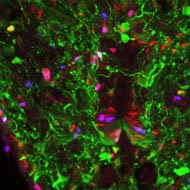In a cross section of the adult zebrafish spinal cord, stem cells (green) can be seen to divide (red and/or blue).
Discovery may offer hope for new therapies in humans
Zebrafish are able to heal their own spinal cord injuries by growing new motor neurons, scientists have discovered.
It is hoped this finding could one day lead to new therapies for people with neurodegenerative conditions, such as motor neuron disease.
Damage to motor neurons in humans - either as a result of neurodegeneration or spinal cord injury - is irreversible.
Yet researchers from the University of Edinburgh found that serotonin - best known as the mood boosting hormone - can help zebrafish recover from spinal cord injuries.
They found the hormone is able to send signals to stem cells found in the spinal cord, boosting the growth of new motor neurons.
Using these findings, scientists say they may be able to grow motor neurons in the lab, aiding research into neurodegenerative conditions in humans.
Dr Thomas Becker, from Edinburgh's Centre for Neuroregeneration and the Euan MacDonald Centre for Motor Neuron Disease Research, said: "Understanding how zebrafish are able to repair damaged nerves could one day help us to trigger similar mechanisms in human stem cells.
"Our hope is that this may eventually lead to new treatments for conditions such as motor neuron disease, for which there is no cure."
Image (c) Catherina Becker, University of Edinburgh.







 The BSAVA has opened submissions for the BSAVA Clinical Research Abstracts 2026.
The BSAVA has opened submissions for the BSAVA Clinical Research Abstracts 2026.
